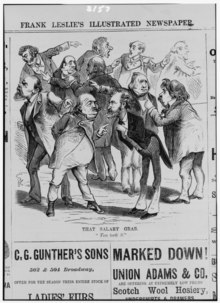
The Salary Grab Act, officially known as the Legislative, Executive, and Judicial Expenses Appropriation Act,[1] was passed by the United States Congress on March 3, 1873, and sparked a firestorm of controversy among members of the government, the general public, and the press. President Ulysses S. Grant signed the act the day before his inauguration for a second term to double the salary of the president and those of Supreme Court Justices. The proposal for a salary increase was fueled by what was considered low pay for members in government, while the salary for the president was the same as it had been for George Washington. The bill subsequently included a 50 percent salary increase for the president and for members of Congress, retroactive to the beginning of their term, which was the most highly contested provision in the bill. Public outcry led Congress to rescind the congressional salary increase. As a protest against the act, the Ohio General Assembly ratified what later became the Twenty-seventh Amendment. The controversy surrounding the bill was one of the contributing factors to the Republicans losing many seats in the 1874–75 United States House of Representatives elections, resulting in a Democratic majority in the United States House of Representatives which began one of the most competitive two-party periods in American history.[2][3]
© MMXXIII Rich X Search. We shall prevail. All rights reserved. Rich X Search
